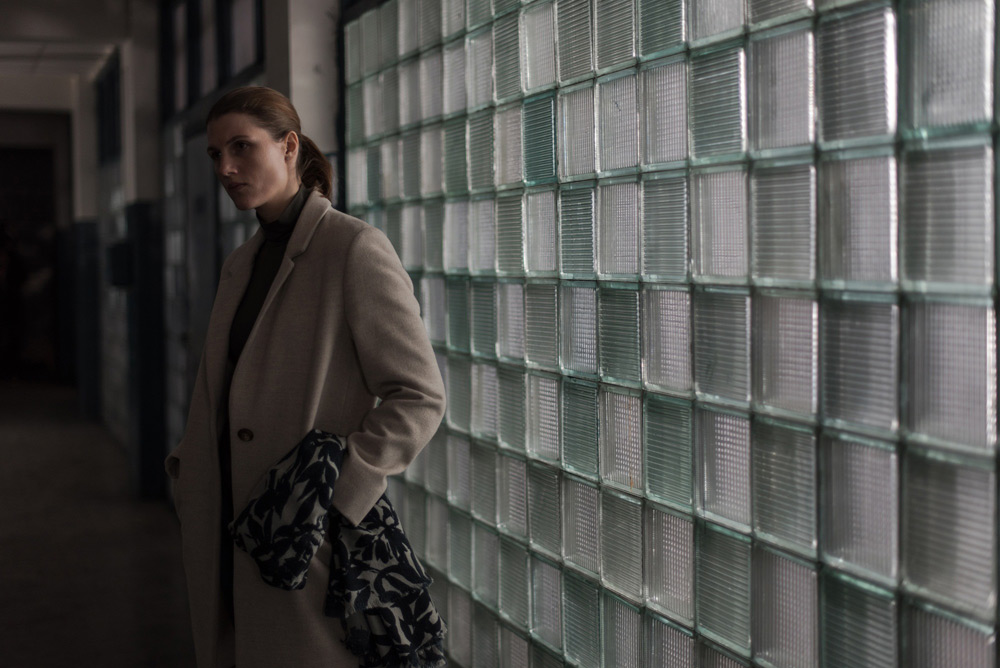Before one sees an image in Andrey Zvyagintsev’s latest drama “Loveless,” one hears a tapping of piano keys that grows more intense as if to clear out the mind to let everything that follows to settle in. Ever since his 2003 debut “The Return,” Zvyagintsev has grown into a master of presentation, with every scene, and even every frame, deepening upon what comes after it to form a story within itself as if they were almost reverse building blocks that nonetheless accumulate forward into an often devastating whole. “Loveless” is no different, except that things will never be complete for Boris (Aleksey Rozin) and Zhenya (Maryana Spivak), an estranged couple living separately in Russia, forever linked by sharing the custody of their 12-year-old son Alyosha (Matvey Novikov). Forced to stayed married so as not to risk Boris’ job working for a highly religious boss that both he and Zhenya rely upon for income, they have both taken lovers that they hope to start new lives with – she with Anton (Andris Keiss), a wealthy businessman (Andris Keiss) who introduces her to an upper echelon of high society she could’ve never dreamed of, and he with Masha (Marina Vasilyeva), a modest younger woman who is already carrying his new child.
The promise of Boris and Zhenya’s separate futures make Aloysha a burden of the past, something neither parent does a good job of hiding from their son and when Aloysha disappears, the two are forced to reckon with not only the frustrating process of attempting to find him, navigating an investigation where the police advise off-the-record to look for search and rescue teams online since no government ties will mean less bureaucracy, but their own desire to see him return when neither wants to look back. While the film’s title is apt for the story that unfolds onscreen, Zvyagintsev brings the same passion to “Loveless” behind the camera that has made him internationally renowned in recent years for films such as “Leviathan” and “Elena,” fearlessly picking apart how people are shaped by class and culture and weigh practical considerations against their emotional needs. Although it’s impossible to separate Zvyagintsev’s films from their setting in contemporary Russia, he’s a dramatist made for these times globally, able to bring out the anxieties of an entire society through the plight of one family and turning abstract ideological trappings into undeniably gripping human struggles. The filmmaker was recently in Los Angeles to attend the west coast premiere of “Loveless” at AFI Fest, preceding a one-week Oscar-qualifying of the film this week in L.A. and New York, and through a translator, we spoke about the intricacies of his production process, how the film grew out of the idea of remaking another, and taking the film around the world.

In 2011, right after “Elena,” we had the idea to adapt Bergman’s “Scenes from a Marriage,” and for four years, we tried to get the rights because we were interested in exploring those family dynamics – the tension between the couple and [other] ideas like this float around my head. Then we read an article about Liza Alert, the volunteer organization that looks for missing people [in Russia] and together, the idea was born of creating this character of a boy who sparks the conflict of the parents, the catalyst of this whole catastrophe in their family. [When] this character was born and we got rid of the Bergman idea entirely because we had different characters.
Each film of yours seems to have explored a different family dynamic. Has that been conscious?
No. There was no conscious decision to have a trilogy, [though] some people call it a trilogy of contemporary Russian life. The subject is just similar of exploring family collisions, but I don’t look at it as a grouping of some sort. It’s independent stories.
This is set in a very specific timeframe, just removed from the present. What was the reasoning?
The context is understandable for people in Russia because these two-and-a-half years [from] 2012-2015 were a turning point in the Russian political climate. East Ukraine protests happened in 2015, [which are part of] the epilogue of the film, and in 2012, people had hope for more positive changes, but by 2015, the government had instituted laws and made society more anti-empathetic. This period [was a time of] screwing in the screws when this change of political climate was happening, and it didn’t take the turn people were hoping for in 2012. [It was like] hope was lost a little bit. Of course, this context is really understandable only for people in Russia.

Of course, everything in the film is on purpose. The difficult question is why. In this case, the idea was to create a world around the main characters – the society they live in, the time they live in – to place them in a context both social and temporal.
The scene where Boris and Zhenya go to her mother’s house to see if she knows about the boy’s whereabouts is great since you see so much history there. How did that come about?
That scene with the mother acts as a mirror for our lead character Zhenya, including this night drive towards the dacha — the suburbs [of Moscow]. It is her subconsciousness and also his, because the mother presents the legacy of Russian fears and insecurities to someone who is deeply insecure and full of complexes. It’s a sick consciousness and to be honest, it’s not a rare example. There’s a lot of mothers, relatives, just women like this that not only I’ve encountered, but it’s someone who’s familiar to people within Russia.
When you’re writing this, do you have strong ideas immediately about what the spaces that the characters are going to live in look like? They tell so much about the characters.
We started working on pre-production with only three pages of synopsis – that was the only thing we had, so we worked on the script parallel to working on the production design. We knew the social status of the characters and we built the apartments as we were developing the script because all those apartments were built in pavilions – they were completely built, so we understood the three characters. Masha, the lover of Boris, was the heiress of her mother’s world, the Soviet world, [Zhenya’s lover] Anton was part of the elite and our lead characters [Boris and Zhenya] were middle class, so [when] we knew the characters we knew how to build their homes.
Those opening piano keys are also so evocative. At what point do you start thinking about the music?
The music was done in post. When editing began, in just the first few days, the composer actually contacted me and he would send me small parts of tracks, schematics essentially. Between sending several tracks, he sent me this piano piece that originally we decided to make the music for the end – I [asked] the composer to make a similar piece for the beginning, so that this main musical piece bookends the film. The rest were independent musical ideas that we developed together. And the composer didn’t read the script and I didn’t give him an assignment. These were just his responses, so essentially this process of musical composition was happening parallel to the process of editing the film.

There were three scenes I was very afraid of – the [separate] erotic scenes between Masha and Boris and Anton and Zhenya, and the third was [Alyosha] the boy crying, I was very worried some of these wouldn’t work and it was very important for them to work.But in terms of technically difficult [scenes], the return [drive] from the [home of Zhenya’s] mother happens at sunrise and it’s this very short period before the sun actually rises above the horizon. It’s a very specific type of light and we were shooting it in a specific setting, so it’s a very short scene by the nature of how quickly the sun goes away from this position. It’s [also] a very [emotionally] difficult scene for the actors, so we shot it during the sunset and then we waited all night for the sunrise to finish and do this scene properly. It was a very difficult day for everyone, including the actors, and the take that’s actually in the movie is the one we shot during the sunrise because we didn’t sleep during the night. This really helped the acting work because this reflected their state. Sometimes these types of things help. [laughs] A tired, exhausted actor plays well.
What’s it’s been like to travel around the world with this and see it it connect with audiences?
It’s the best emotions. There’s a reason for everything.
“Loveless” opens in Los Angeles at the Laemmle Royal and New York at the Quad Cinema on December 1st for a limited Oscar qualifying run, ending on December 7th. It will open again on February 16th.




